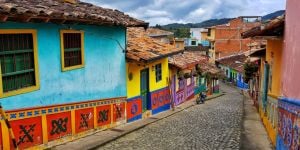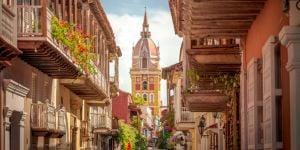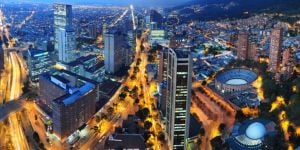Common misconceptions and clichés about life in Colombia
Hello everyone,
Old clichés die hard, as the saying goes... and living in Colombia can generate lots of misconceptions in the eyes of the people.
What are the most common misconceptions about the expat lifestyle in Colombia?
What are the most common clichés about life in Colombia in general?
Did you have a biased view of the country before moving there? What is you view now?
Thanks in advance,
Priscilla
Priscilla wrote:What are the most common misconceptions about the expat lifestyle in Colombia?
What are the most common clichés about life in Colombia...?
Did you have a biased view of the country...?
I did have a biased view of Colombia before visiting there for the first time in June-July of this year .. and making a second visit more recently.
Of course, I’m not the only one who has had a bias.
The widespread misconception that murderous drug lord Pablo Escobar created a generation ago -- he was killed in 1993 after the U.S. poured resources into the efforts to take out Escobar and the cartels -- is still with us.
Fear of violent danger from drug cartels has not disappeared from the Expat consciousness -- despite the killing of Escobar .. the 21st century campaign by government and police to take back Colombia from terrorists, in particular FARC -- a campaign presided over by then-President Álvaro Uribe .. the marginalizing of FARC mostly to remote jungle areas .. and the years that have passed since Colombia’s cities were terrorized to an alarming extent.
Lingering concepts about Colombia’s violent past have persisted beyond the country’s borders. How else to explain the fact that relatively so few Expats have moved to a country so charming and geographically so close to North America as is Colombia?
This weekend, Colombia has the opportunity to show the world whether it is willing to put the extreme violence of the past behind it .. and vote to give FARC evil-doers a path back into Colombia society. On October 2nd, a national referendum will be held to determine whether the FARC peace treaty negotiated in Havana, Cuba .. and signed this week in Cartagena, Colombia, will be approved by the people, initiating a transition that could re-shape domestic and international concepts about Colombia, going forward.
cccmedia
cccmedia wrote:Lingering concepts about Colombia’s violent past have persisted beyond the country’s borders. How else to explain the fact that relatively so few Expats have moved to a country so charming and geographically so close to North America as is Colombia?
Actually, there is another conception that may be deterring Expats from moving to Colombia.
Tax policy.
In Ecuador, where I live and own a home, my income is not currently taxed by Ecuador -- nor by the U.S., my country of citizenship.
If I moved to Colombia, the government there could take 33 percent of my worldwide income plus an annual tax on a percentage of my worldwide assets.
Until several years ago, Colombia gave a pass to new Expat arrivals for their first five years. That pass has been revoked, and if Colombia does not re-institute a foreigner-friendly tax policy, many Expats may still avoid Colombia as a full-time location regardless of changing views about the country’s level of violence.
-------
Expats who visit/live in Colombia for 183 days or fewer in any 12-month period currently are not considered “tax residents” regardless of visa-status or ownership of residential property.
The combinations of factors stated in this post may make Colombia a desired second-home destination for snowbirds and other part-time Expats in coming years.
cccmedia in Quito, Ecuador
cccmedia wrote:f I moved to Colombia, the government there could take 33 percent of my worldwide income plus an annual tax on a percentage of my worldwide assets.
And that's unfortunate. It's something I didn't know before visiting the expat sites.
I have a long time before I get Social Security, but I don't want anyone taking a third of it. It's already a tax. I don't think I should have to pay a tax on it again.
It's another reason to consider Ecuador. I loved Ecuador, too. But they could suddenly change their tax policies, also. Let's hope not.
cccmedia wrote:This weekend, Colombia has the opportunity to show the world whether it is willing to put the extreme violence of the past behind it .. and vote to give FARC evil-doers a path back into Colombia society. On October 2nd, a national referendum will be held to determine whether the FARC peace treaty negotiated in Havana, Cuba, and signed this week in Cartagena, Colombia, will be approved by the people, initiating a transition that could re-shape domestic and international concepts about Colombia, going forward.
Headline in the New York Times international edition tonight -- October 2, 2016....
Colombia Peace Deal Headed For Defeat, Causing Shock and Uncertainty
From the article:
-- Colombian voters appeared headed to reject a peace deal that had been signed by their president and the largest rebel group, FARC, leaving the fate of a 52-year war uncertain.
-- Votes for ‘no’ were ahead by half a percent with 99 percent of the ballots counted.
-- The surprise surge by the ‘no’ votes -- polls showed the referendum winning by a resounding margin -- “left the country in a dazed uncertainty not seen since Britain voted to leave the European Union....” (NY Times)
Tax policy for foreign residents is what caused me to turn away from Colombia and orient toward Ecuador.
The secondary reason relates to advice from a friend who is a long term resident in Bogota and astute follower of goings-on in Colombia - the warning being that any engagement with Colombian gov't institutions is potentially very perilous. A great range of problems arising from bureaucratic inscrutability or incompetence can befall you and cost time and money as you try to report world-wide income and pay your taxes. I wonder if anyone can comment on their experience dealing with Colombian taxation processes.
A more significant reason is for anyone that has a substantial investment portfolio that they are deriving income from. Noting that you would have to report all of your investments, assets and related income including what you have in your home country, how many people in your accountant's office and in gov't offices that process your return would then be privy to not only the details of your wealth but your exact address, family composition, cell phone number etc. Not a risk that I would incur.
I could suck it up and pay some tax to Colombia if I were confident that it wouldn't jeopardize my security or mental health but that isn't the case and in Ecuador you don't have to worry about this at all.
BOGOTA -- The FARC peace treaty narrowly failed to pass, losing 50.2 to 49.8 percent, according to the Colombian government.
The nation’s ‘no’ vote is a major embarrassment to the Santos government, according to the New York Times.
Nevertheless, both sides say they will not go back to fighting, and a ceasefire remains in effect.
Meetings are being arranged to decide how to go forward in light of Sunday’s referendum defeat.
Source: The New York Times
My view, from a teacher's perspective, is that the education system is severely lacking in Colombia. I work at one of thevtop private schools in Bogota. Administrators are not interested in teaching children values such as hard work and honesty. They are only really interested in getting a pass grade. This is the reason why many well known institutions has indicated that Colombia has one of the lowest level of English proficiency in the whole world (number 58 out of 70 measured countries). This is certainly a main contributor to the country not moving very fast in developing itself further and why other countries will always do better than Colombia.
Unlike most of the rest of the world they also cling fiercely not Spanish. They expect foreigners to speak Spanish whereas this is not expected in for example Vietnam, Holland, Iceland and most other countries. The notion that English has won the battle as the global lingua franca that we speak to all who do not share our mother tongue has not sunk in here at all. And Im saying this as an English teacher who has a different mother tongue than English myself
I also feel that Colombians love to blame others for their problems whereas they never have insight into their own behaviour as the real source of their problems.
I know that this is a really damning view I have but its the product of having lived and worked here now for a year and a half.
hannoliebenberg wrote:Unlike most of the rest of the world they also cling fiercely [to] Spanish. They expect foreigners to speak Spanish whereas this is not expected in for example Vietnam, Holland, Iceland and most other countries. The notion that English has won the battle as the global lingua franca that we speak to all who do not share our mother tongue has not sunk in here at all.
There are over 200 countries on the planet, and the notion that somebody can show up in over 100 of them and get by with just English is far-fetched, to say the least. Hanno’s knowledge of Vietnam and Holland is not representative.
I have been to many countries in Asia and here in Latin America .. and -- with the exception of a few tourist hotels and travel agencies -- practically everybody’s speaking the native tongue, not English.
Here in Ecuador, Expats who expect the locals to surrender to English are often considered to have an arrogant point of view.
cccmedia in Quito, Ecuador
Well, I have been to 21 countries so far in my life, so I think I have a pretty good expierence behind me to know what I am talking about.
Also, the lingua franca of the world is internationally accepted as English, whether we like it or not. Go and read any reputable article about it.
Lastly, you live in a country very similar to Colombia, so I would expect the same outdated views to persist there. And futhermore, looking at your country's global rankings for economy, level of education etc. , I think my views are also borne out by that.
Lastly, I am not technically a native speaker of English, however, I am just as good at it as a native speaker. They massacared my ancestors a mere 100 years ago in droves (ever heard of the Anglo Boer war?), so I have no special affinaty for the language. I just know how things work in the world and have learnt to accept the truth. I speak 3 languages fluently so I am far from the normal American or whatever who just speak English and expect the rest of the world to do the same.
hannoliebenberg wrote:My view, from a teacher's perspective, is that the education system is severely lacking in Colombia.
Well, coming from the USA, I guess I shouldn't throw stones at anyone's education system. We're not the most educated people on the planet.
But yeah, when I see school kids in Colombia walking around BEFORE LUNCH and that's all the school they're getting for the day, that's pretty bad. When the Colombian kids get off the entire month of December, that's unacceptable.
But now that the gov't doesn't have to combat the FARC anymore, maybe they can build more schools so the kids don't have to go just half a day. I hope so. The Colombians deserve better.
However, on the positive side as well as to prove my point, there are some really forward looking people in Colombia such as President Santos who is making a drive to get Colombia to become a bilingual country by 2020. Cudos to him! So whereas the writer from Equador was trying to pin "arrogant views" on me, unfortunately my views are also shared by the Colombian government, as far as the need for much better English goes.
The problem however is that not everybody in Colombia is as forward thinking as President Santos and his current government, as we clearly saw in yesterday's referendum.
Colombia in general is also very outdated when it comes to it's views on LGBT rights and even their Spanish is peppered with homophobic language.
Again, the current government is trying to make a change on this issue by having legalised full gay marriage recently as well as the department of Education having announced new guidelines to protect the rights of kids affected by this in Colombian schools.
However, as with my other examples, I immediately saw some people saying (without even having read one sentence of the new guidelines), that now gay porn is going to shown to school children! And catholic schools have immediately also shown their dissapproval for what the rest of the world has accepted as the right thing to do.
One step forward, two steps back unfortunately.
The voting Colombian population was almost evenly split on whether to accept the peace deal promoted by Santos and FARC - most, by just a small majority, do not believe it to be a good or fair deal especially from the victims' point of view, and not for the country going forward - it's viewed by many as a cave-in to a small band of thugs disguised as revolutionaries who are going to be rewarded with pensions and seats in the government that they did not earn, but instead extorted by kidnappings, drug trafficking, robbery and violent killings not just against the army and the government but against the very people they claimed to want to help.
President Santos is far from being universally beloved as a forward-thinker, to say the least. No one wants to go back to armed conflict but the plebiscite shows that by a small majority, more Colombians are in tune with policies along the lines of Uribe that made great progress against FARC rather than those of Santos which are seen to coddle them.
Well , now we are on a totally different topic really and I accept that there is really no right or wrongs when it comes to political views.
I do however think that all the polls indicated that the majority of Colombians supported President Santos' attitude towards the matter (by a large majority of 67 percent), but because of inaction and the view that the yes vote would win anyway (plus the stormy weather in the north), many of the yes voters simply didn't go and vote yes, and so the no side narrowly won.
It is just my personal opinion as well as looking at very similar examples such as South Africa (which also had a truth and reconciliation commission that Santos wanted), that Santos was definitely correct on choosing to compromise for peace.
It might be correct to say that President Santos is not universally beloved by Colombians, but it my personal view based on his recent interviews with CNN (in excellent English), the fact that he was probably going to recive the Noble Peace Prize as well as internation media outlets who recently described him as a tough guy turned "dove" that he is indeed very forward thinking. And like I said, unfortunately many Colombians are not as forward thinking as he is, which is the point of where my whole schpiel about Colombia started.
I can't wrap my head around the vote. And I understand it's a different country. But in the US the president has the power to make treaties with foreign governments under our Constitution.
If nothing else, the president of Colombia can just say, "Our army won't come after you if you stop attacking our people. It's done. It's over."
So the vote baffles me a bit.
"Forward thinking" is a subjective term and I assure you that in Colombia there are many who would apply that to Santos only with desprecio. There are many examples throughout history where "forward thinkers" have turned out to be not such great guys and gals after all, especially when they had the power to enforce their "forward thinking" on others.
The Colombian people approached this plebiscite carefully and many on each side easily understood how another could vote differently. The attitude seemed to be summed up well in one editorial which urged the populace to vote de acuerdo con su libre saber y entender on the matter. I accept that they did, and that they will continue to work things out peacefully. At least the vote has been a big first step.
Well, what do those liberals iñ the far north (Norway) know? But they did just give the guy the Nobel Peace Prize!
hannoliebenberg wrote:Well, what do those liberals in the far north (Norway) know? But they did just give the guy the Nobel Peace Prize!
The five members of the Norwegian Nobel Committee, which is responsible for choosing the peace prize winner, are appointed by the Norwegian Parliament. The committee acts in accordance with the will of the Swedish inventor and philanthropist Alfred Nobel, who died in the late 1800s, which will established the famous peace prize. Source... Wikipedia.
Well, what do those liberals iñ the far north (Norway) know? But they did just give the guy the Nobel Peace Prize!
My point is: Colombians narrowly voted no to his plans, the absolute authority internationally said he did great. So Colombians are out of sync with international views (and its my contention that it isnt just on the topic of peace) and ways of doing things.
Well, what do those liberals iñ the far north (Norway) know? But they did just give the guy the Nobel Peace Prize!
My point is: Colombians narrowly voted no to his plans, the absolute authority internationally said he did great. So Colombians in general, but of course not all, are out of sync with international views (and its my contention that it isnt just on the topic of peace) and ways of doing things.
The committee in Oslo, Norway, acknowledged the Colombian peace process, which is ongoing.
In addition to the FARC negotiations in Cuba, the government of Colombia will be holding peace and resolution talks with the ELN, the putative national liberation army, here in the capital of Ecuador starting later this month, October 2016.
cccmedia in Quito
May I ask why an expat in a different country frequently expreses "insights" on Colombian life?
And the peace prize will be given to Santos, not anybody else. And just like other recipients HE will go down in history as a man who tried to do the right thing for peace. Is Mandela today remembered or "the South African peace process"? Im sorry to say, but to give the prize to him says so much and also says just as much about the majority of Colombians who voted against the plan.
hannoliebenberg wrote:May I ask why an expat in a different country frequently expreses "insights" on Colombian life?
Although your question seems to be coming from a hostile place, I will respond.
The Ecuadorian capital where I primarily live is only several hours by highway from Colombia and a relatively convenient trip by air.
I have visited Colombia for a total of about three months this year, as I find the air cleaner than in Quito .. and the altitude of Eje Cafetero and Medellin me convienen.
Also, Colombia has low stakes casino blackjack whereas casinos here in Ecuador have been closed since 2012.
There are other things I like or love about Colombia, but I think I have already answered the above question.
I expect to continue to visit Colombia up to 182 days a year (more time would expose me to 30/plus percent taxation on my U.S.income plus an assets tax) and to participate in online forums about Colombia.
cccmedia in Quito
The school system is not a system it is a big box to put poor children in 45-50 in a box
running wild not learning.. One teacher can not teach 48-50 children that more than 80% come from homes with no father or a mother and father that are drunk all day
Much sexual abuse , emotional abuse , physical abuse .. So sad for the victims that were born in Colombia
" we live the life we learn"
Make your relocation easier with the Colombia expat guide

Childcare, family activities and education in Colombia
Family is extremely important to Colombians and many expats find it a great place to raise children. Colombia ...

Finding work in Colombia
Though the economy in Colombia is continuing to grow, it can be difficult for foreigners to find work. That said, ...

Accommodation in Colombia
As long as you know what to expect, finding and securing accommodation in Colombia isn't too difficult. Demand ...

Leisure activities in Colombia
Both visitors and those who stay long term in Colombia will have no shortage of things to do. Colombia's rich ...

The Working Holiday Visa for Colombia
What makes Colombia unique is that it is one of the most diverse countries in the world, bordered by two oceans ...

Visas for Colombia
There are 3 types of visas for foreigners who wish to live in Colombia. If you are planning to stay in Colombia ...

Travelling to Colombia
Foreigners visiting or moving to Colombia should research all the requirements well in advance of travel. For a ...

Travelling around Colombia
Most Colombians live in urban centers and do not own cars. That said, expats living in large or mid-size Colombian ...
Forum topics on living in Colombia



